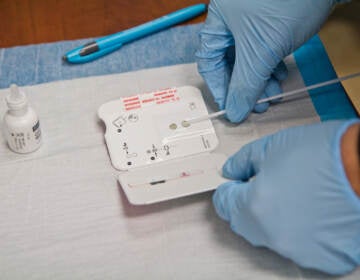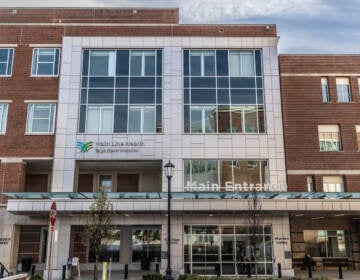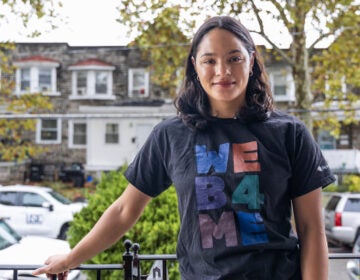3 big ideas to fuel an equitable COVID recovery
A social worker and a disaster expert describe the things Philly can do to recover from coronavirus and heal the injustices revealed by the pandemic.
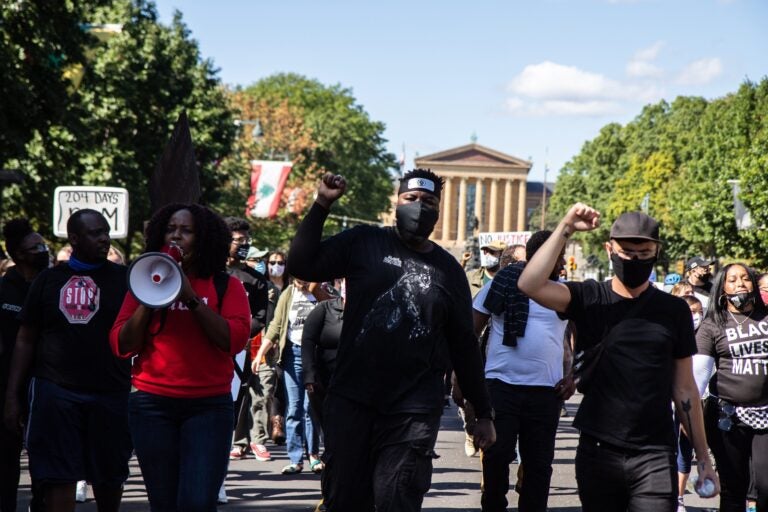
Protesters took to the streets Saturday, demanding justice for Black people killed by police. (Kimberly Paynter/WHYY)
The COVID-19 pandemic — now responsible for 1,851 deaths and at least 150,000 workers losing their jobs — has spared no Philadelphia neighborhood from pain and disruption.
The end isn’t yet in view, but Philadelphians already have recovery in mind. The Federal Emergency Management Agency (FEMA) National Disaster Recovery Framework published this summer offers an optimistic view of recovery, promising the “restoration and strengthening of key systems and resource assets that are critical to … economic stability, vitality, and long-term sustainability.” Sounds good.
Democratic presidential candidate Joe Biden tells us we could even aspire to “Build Back Better.” Sounds great.
So we ask, what is missing from all of this hopeful recovery talk?
Justice.
In fact, the word never appears in the FEMA Framework. History shows time and again that once recovery resources are allocated, the best a city can usually hope for is to get back to some kind of pre-disaster “normal.” But what if “normal” in your community before the pandemic was a day-to-day disaster of injustice: Structural racism and violence, health inequality, failing schools and low-paying jobs, and environmental hazards? No city in America, especially Philadelphia with the highest poverty rate among American cities, is going to come out of the pandemic better than before unless we radically alter our conception of disaster recovery.
Disaster recovery-as-usual doesn’t account for the historical conditions that make disasters worse for some than for others. A textbook disaster recovery isn’t going to be enough. We need a just recovery.
So what would that look like?
Recognizing the everyday inequalities and working toward eliminating them
A just recovery demands that we take a hard look at the everyday inequalities exposed by the pandemic. A recent study by Drexel University public health researchers Usama Bilal, Sharrelle Barber, and Ana V. Diez-Roux looked at COVID-19 in Chicago, New York City, and Philadelphia, and makes it clear that the health impacts of COVID-19 have not been experienced equally. Historically disadvantaged Philadelphians — African Americans especially — have been sicker and died at higher rates.
The researchers concluded: “Communities of color and of low socioeconomic status have long borne the burden of adverse health linked to discrimination, structural racism, xenophobia and systematic disinvestment leading to a lack of material resources. In health crises, such as this one, all these social problems become magnified, reflecting a longstanding history of racial and economic injustice.”
Investment in rapidly-improved health outcomes for the city’s poorest and most marginalized residents should be at the top of the list for a just recovery from COVID-19.
Another example, perhaps unexpected — even many Philadelphians who appear to have privilege are suffering. “This pandemic has been shining a light on an issue of basic needs and security among students that was not getting a lot of attention,” according to David Koppisch of the Hope Center at Temple University. Approximately 50% of Philadelphia students in two-year colleges experience food insecurity under “normal times.”
Access to the federal Supplemental Nutrition Access Program needs to be increased, even for those whom we may assume are doing fine.
Rebuilding with the climate crisis in mind
It’s not only the city we have today, it’s the city being remade by climate change that we must take into account. “The cadence of disruption is increasing,” explains Saleem Chapman, Chief Resilience Officer for the City of Philadelphia. “COVID provided a proxy for what we could expect from climate change. It exposed the intersections of race, class place, and invisibility.”
Climate change is already leading to storm and heat intensification. “Think about what just happened this year,” Chapman points out. “We had COVID. We also had a tropical storm that happened in August, which had a significant impact on the Eastwick community. We had a heat wave, the third warmest summer on record for the city. And then we had a sustained period of social unrest connected with ant-Black racism. So we’re seeing these overlapping factors, we’re seeing the compounding effect that they have.”
Engaging and centering the community — including incarcerated populations
A just recovery also means engaging individuals who have experienced legacies of inequity and marginalization and asking them “what does recovery mean for you?”
It means taking concepts used in abstract and theoretical senses, and redefining both their meanings and applications. How can the principles of community be applied alongside the principles of emergency management to produce a just recovery that is responsive and shaped by those who experience the disaster?
In describing POWER, an interfaith organizing group he helped found 11 years ago, David Koppisch insists that we must engage those who are directly affected in developing strategies to go beyond what was before and produce different mechanisms.
We have to “tap into faith communities, and that community of folks who are close to neighborhoods, close to communities to work on the issues that most impact them.” Saleem Chapman agrees, pointing out that the city’s new Environmental Justice Advisory Commission is a community-based intervention, rethinking disaster recovery according to the “lived experience of those who understand what is happening on the ground.”
This also means engaging individuals who are often invisible in recovery plans, like those who are incarcerated. Jails and prisons have become hot spots for COVID-19 transmission, even while the communities around them have managed to contain the spread, and so we must interrogate whether the notions of justice that lock individuals away are those we want to continue to rely on. Carceral facilities are embedded within communities — incarcerated populations should be incorporated within discussions about the harm of disasters to the members of those communities.
Just recovery for incarcerated people requires adopting strategies like decarceration or reducing the number of individuals behind bars; increasing the variety of release options, like clemency; increasing monitoring and oversight for carceral institutions; and most importantly, reimagining the use of incarceration as a means of punishment in the first place. We must begin to link together the institutions that disproportionately perpetuate harm against certain populations, and reduce our reliance on them, and conceive new approaches to justice.
To its benefit, Philadelphia is one of the cities in America with the highest concentration of advocates working to expose the legacies and urgency of urban inequalities — and we will need all of them when it comes time to recover from COVID-19.
A just recovery will not return communities to pre-disaster norms of economic precarity, violence and victimhood, environmental and health disparities. But the work will not be easy: It requires an honest accounting for the impacts of the disaster, the pre-existing conditions of inequality that produced the worst conditions of the pandemic, and creative policies and mutual aid assistance to see us through to a possibly better Philadelphia for all Philadelphians.
Felicia Henry is a licensed social worker and a Ph.D. student in the Department of Sociology and Criminal Justice at the University of Delaware, where she is also a Bill Anderson Fund Fellow.
Scott Gabriel Knowles is professor and head of the Department of History, Drexel University. He is the author of The Disaster Experts: Mastering Risk in Modern America.

Subscribe to PlanPhilly
WHYY is your source for fact-based, in-depth journalism and information. As a nonprofit organization, we rely on financial support from readers like you. Please give today.



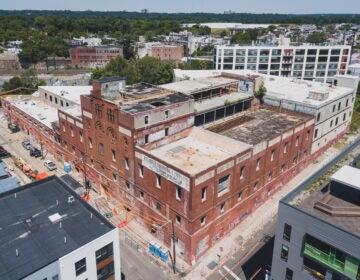


![CoronavirusPandemic_1024x512[1]](https://whyy.org/wp-content/uploads/2020/03/CoronavirusPandemic_1024x5121-300x150.jpg)
